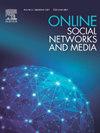A first principles approach to trust-based recommendation systems in social networks
IF 2.9
Q1 Social Sciences
引用次数: 0
Abstract
This paper explores recommender systems in social networks which leverage information such as item rating, intra-item similarities, and trust graph. We demonstrate that item-rating information is more influential than other information types in a collaborative filtering approach. The trust graph-based approaches were found to be more robust to network adversarial attacks due to hard-to-manipulate trust structures. Intra-item information, although sub-optimal in isolation, enhances the consistency of predictions and lower-end performance when fused with other information forms. Additionally, the Weighted Average framework is introduced, enabling the construction of recommendation systems around any user-to-user similarity metric.
社交网络中基于信任的推荐系统的第一原则方法
本文探讨了社交网络中的推荐系统,该系统利用诸如项目评级、项目内相似性和信任图等信息。我们证明了项目评价信息在协同过滤方法中比其他信息类型更有影响力。由于难以操纵信任结构,基于信任图的方法对网络对抗性攻击具有更强的鲁棒性。项目内信息虽然单独来看不是最优的,但当与其他信息形式融合时,可以增强预测的一致性和低端性能。此外,还引入了加权平均框架,使推荐系统能够围绕任何用户对用户的相似度度量构建。
本文章由计算机程序翻译,如有差异,请以英文原文为准。
求助全文
约1分钟内获得全文
求助全文
来源期刊

Online Social Networks and Media
Social Sciences-Communication
CiteScore
10.60
自引率
0.00%
发文量
32
审稿时长
44 days
 求助内容:
求助内容: 应助结果提醒方式:
应助结果提醒方式:


